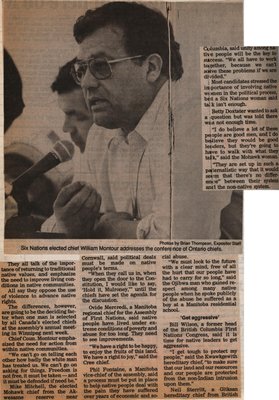"They All Talk of the Importance of Returning to Traditional Native Values"
- Publication
- Brantford Expositor, 1991
- Full Text
They all talk of the importance of returning to traditional native values, and emphasize the need to improve living conditions in native communities.
All say they oppose the use of violence to advance native rights.
The differences, however, are going to be the deciding factor when one man is selected by all Canada's elected chiefs at the assembly's annual meeting in Winnipeg next week.
Chief Coun. Montour emphasized the need for action from within native communities.
"We can't go on telling each other how badly the white man has treated us. We can't go on asking for things. Freedom is not free, it must be taken - and it must be defended if need be."
Mike Mitchell, the elected Mohawk chief from the Akwesasne reserve near Cornwall, said political deals must be made on native people's terms.
"When they call us in, when they open the door to the Constitution, I would like to say, 'Hold it, Mulroney,'" until the chiefs have set the agenda for the discussion.
Ovide Mercredi, a Manitoba regional chief for the Assembly of First Nations, said native people have lived under extreme conditions of poverty and abuse for too long. They need to see improvements.
"We have a right to be happy, to enjoy the fruits of this land. We have a right to joy," said the Cree chief.
Phil Fontaine, a Manitoba vice-chief of the assembly, said a process must be put in place to help native people deal with the pain they have suffered over years of economic and social abuse.
"We must look to the future with a clear mind, free of all the hurt that our people have had to carry for so long," said the Ojibwa man who gained respect among many native people when he spoke publicly of the abuse he suffered as a boy at a Manitoba residential school.
'Get aggressive'
Bill Wilson, a former head of the British Columbia First Nations Congress, said it is time for native leaders to get aggressive.
"I get tough to protect my people," said the Kwawkgewith hereditary chief, "to make sure that our land and our resources and our people are protected from the non-Indian intrusion upon them."
Neil Sterritt, a Gitksan hereditary chief from British Columbia, said unity among native people will be the key to success. "We all have to work together, because we can't solve these problems if we are divided."
Most candidates stressed the importance of involving native women in the political process, but a Six Nations woman said talk isn't enough.
Betty Doxtater wanted to ask a question but was told there was not enough time.
"I do believe a lot of these people are good men, and I do believe they would be good leaders, but they're going to have to walk with what they talk," said the Mohawk woman.
"They are set up in such a paternalistic way that it would seem that there's no difference" between their system and the non-native system.
- Thompson, Brian, Photographer
- Media Type
- Newspaper
- Publication
- Item Types
- Articles
- Clippings
- Description
- "They all talk of the importance of returning to traditional values, and emphasize the need to improve living conditions in native communities."
- Date of Publication
- 1991
- Subject(s)
- Personal Name(s)
- Montour, William ; Mitchell, Mike ; Mercredi, Ovide ; Fontaine, Phil ; Wilson, Bill ; Sterritt, Neil ; Doxtater, Betty.
- Corporate Name(s)
- Assembly of First Nations.
- Local identifier
- SNPL002989v00d
- Collection
- Scrapbook #3
- Language of Item
- English
- Creative Commons licence
 [more details]
[more details]- Copyright Statement
- Public domain: Copyright has expired according to Canadian law. No restrictions on use.
- Copyright Date
- 1991
- Copyright Holder
- Brantford Expositor
- Contact
- Six Nations Public LibraryEmail:info@snpl.ca
Website:
Agency street/mail address:1679 Chiefswood Rd
PO Box 149
Ohsweken, ON N0A 1M0
519-445-2954



